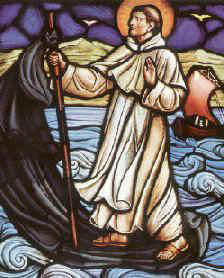|
To work for the proper implementation of canon law is to play an extraordinarily constructive role in continuing the redemptive mission of Christ. Pope John Paul II |
|
|
|
|
Resolution 1152 x 864 |
Updated 12 jan 2013 |
Review of MacDonald & Tadie, eds., Chesterton and Lewis: the Riddle of Joy (Eerdmans, 1989) 304 pp. |
|
Edward Peters, Review of Madonald & Tadie, eds., The Riddle of Joy (1989), in Reflections (Summer, 1989) 11.
|
This reviewer cannot claim to be an expert in either C. S. Lewis or G. K. Chesterton, so we must leave the technical review that The Riddle of Joy surely merits to more capable pens. But as Chesterton and Lewis are probably the two most popular Christian writers of this century, a few comments on this splendid study of these two writers that has just been published by Michael Macdonald and Andrew Tadie are surely in order.
Now if the names of those editors do not leap off the page in recognition, it is, I suggest, evidence of their commitment as teachers to teaching. For them, teaching is not something to be squeezed in between scholarly article deadlines. It was primarily their dedication to students, in fact, that led them to develop over the last several years a series of lectures and study sessions on Lewis and Chesterton which culminated in 1987 in a week-long conference attended by many of the world's most respected Lewis and Chesterton scholars. The fruit of that conference is The Riddle of Joy, and while it contains the commentary of such masters as Hooper, Howard, Kreeft, and Dale, not one word was written by Tadie or Macdonald. Their task has always been but to facilitate their students' reading of Chesterton and Lewis.
As to the present work, who can make use of this collection? Lewis and Chesterton scholars will find it informative, of course, but what about the rest of us? Naturally, the more one brings to this discussion by way of having read more Lewis and Chesterton, the more one will gain from The Riddle of Joy. But at a minimum, one should have read Chesterton's The Man Who Was Thursday, Orthodoxy, The Ballad of the White Horse, The Napoleon of Notting Hill, and at least some of the Father Brown series. For Lewis, read The Chronicles of Narnia, Prayer, The Screwtape Letters, and Perelandra before starting this book. Two results will follow: first, one cannot but be moved to read their other works (which, after all, was precisely the editors' point); second, one will have enough referents to follow the rich discussion and insights offered in The Riddle of Joy.
Christopher Derrick's essay, the keynote address for the conference, is an odd a way to open this book as his speech must have been to open the conference. He is as irrepressible as ever, and mildly irreverent, as he strives to save us Yanks from a presumptive latria for Lewis and Chesterton. Fr. Walter Hooper (Lewis' literary executor) and Fr. Ian Boyd (editor of The Chesterton Review) both seem to do a neater job of helping us see Lewis and Chesterton more clearly than does Derrick. Alzina Stone Dale and John Burton serve similar ends, but focus more on the political and social conditions through which swirled Chesterton, but which swirled around Lewis. Richard Purtill gives us a personal look at the publishing house (Sheed & Ward) that was really an apostolate.
James Houston's essay on Lewis' prayer life (after which one should skip forward to Lyle Dorsett's on the effectiveness of Lewis) and William Blissett's remarks on the relationship between the young turks Chesterton and Max Beerbohm were both informative, and even could have been longer. Evan Gibson's "The Centrality of Perelandra to Lewis' Theology" is a technically demanding study, but Thomas Howard's writing on Lewis' literary achievement offers one of the most comprehensible works of literary criticism (excepting Chesterton's own) this reviewer has ever been blessed to find. Jay Corrin's discussion of Chesterbelloc and sociopolitics provides an outline of Distributism and illustrates the growing interest in Distributism among economists.
David Dooley (an editor of the immense Ignatius Press project of publishing the collected works of Chesterton) answers Fr. Stanley Jaki's challenge and guides the reader through what Chesterton called "a landmark in my life," his long debate with the socialist Blatchford. Kent Hill's essay, like some others mentioned above, can actually be criticized for being too short, but that is only because he displays such a sure grasp of Chesterton and reason that it leaves one asking for more (delightful) examples.
The two most difficult essays, Peter Kreeft on Lewis' argument from desire, and Janet Knedlik on Chesterton and Derrida, remain for all that quite manageable, though perhaps not best begun too late in the evening or too early in the morning. Fr. David Leigh's essay on the psychology of conversion in Chesterton and Lewis is well balanced, though I can't help thinking it could have come earlier in the volume, perhaps just before Dooley's.
One closing observation on a most enjoyable book: these pages have an undercurrent, one that surfaces only in cryptic references or between the lines, as it were. It is treated with decorum and respect, but it is there. Simply put, G. K. Chesterton converted to Catholicism, and C. S. Lewis did not. (I still meet Catholic fans of Lewis who are surprised to learn this.) That both men were unswervingly dedicated to the discovery of the Truth seems to me beyond question, and the conferees gathered by Tadie and Macdonald dignified their subjects with the same honesty.
Nevertheless, truth literally makes a difference. The editors of and contributors to The Riddle of Joy, I suggest, are content to let the differences speak to inquiring minds for themselves.
|




